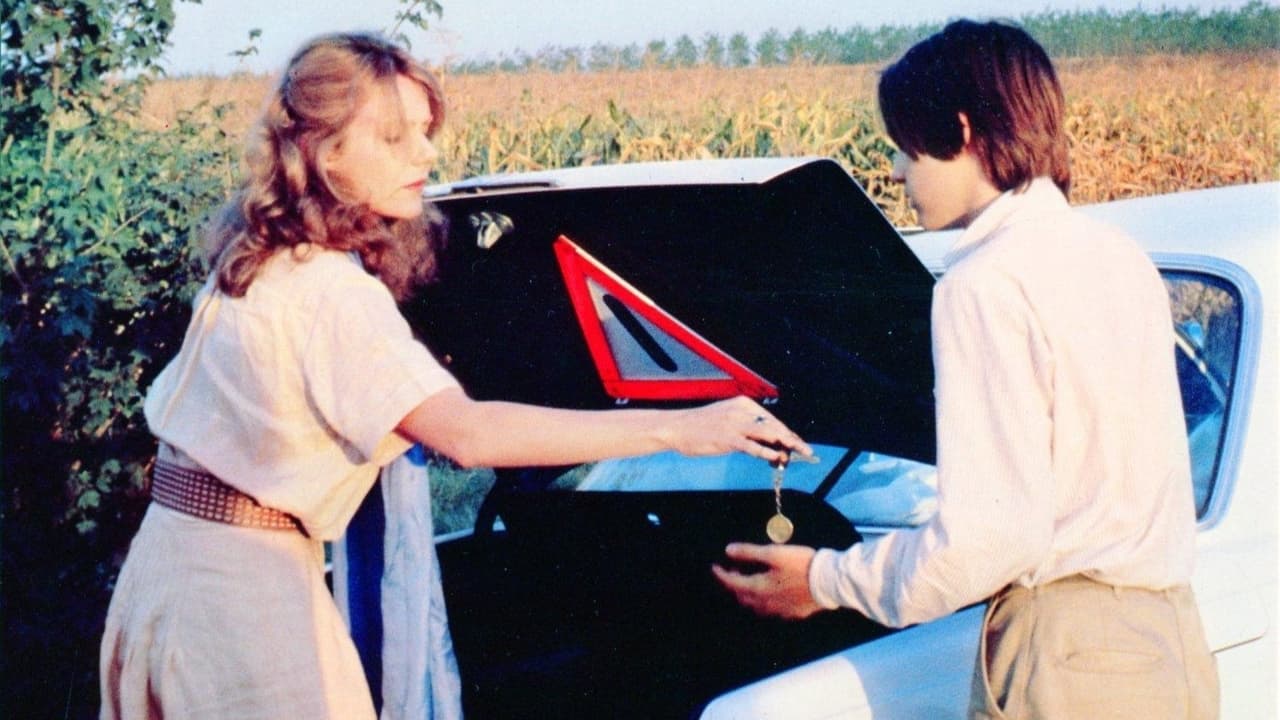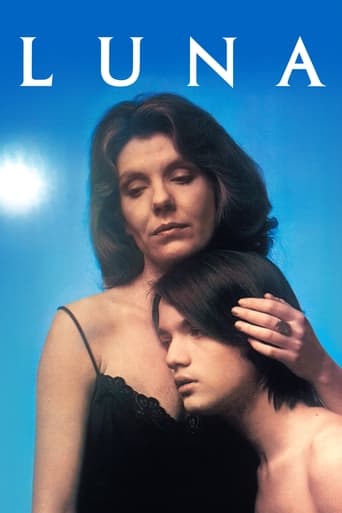

"La Luna is a wonderful film - Caterina (Jill Clayburgh) goes with her son Joe (Matthew Berry) to Italy after the death of her husband/Joe's "father". In Italy they stand by themselves and Joe, a lonely boy, is still grieving his "father"'s death. This is not apparent because Joe looks like a normal teenager. Parties, girlfriend and so on. One day during Joe's birthday party, Caterina discovers that her son is on heroine. She doesn't know what to do. She gets to know that Joe, her son, feels very lonely and she tries to deepen their relationship. It is not easy. Joe is sensitive and very intelligent. It wouldn't do to just pat his head, tell him to stop with the nonsense and be a good boy - there's no use for the repressive approach. And their relationship gets very close - psychologically and sexually speaking. It's amazing. A special love relationship will grow between mother and son. I don't believe that a film like "La Luna" could be made in the USA. The USA are too puritan for this kind of thing.There's a beautiful interview of Bertolucci featured in the bonus in which he comments on how his own remembrances influenced the film - he was a baby and his mother was cycling on the road one night. She was young and beautiful and he remembers seeing her face and then the moon in a way that both seemed to blend together for some moments. The bonus shows us Bertolucci being interviewed in different phases of his life. He is very intelligent and human and has really something to say."La Luna" is a very beautiful film that can touch a delicate subject with tenderness and poetry. Jill Clayburgh and Matthew Barry are outstanding as mother and son and I must confess that during the film I wished Jill Clayburgh were my mother. Oh Yes! I didn't like the ending so much, but I think that maybe Bertolucci wanted an operatic ending to "La Luna", it is a matter of taste, anyway.
... View MoreIn a way I feel sorry for Bernardo Bertolucci's La Luna, though maybe more for Bertolucci than the film itself. Having come off of the monumental undertaking of 1900, he probably wanted to still keep the challenging creative juices flowing, and in doing so concocted an idea surrounding a mother and son who lose their closest significant other and go to Rome, only to get dragged into their own created mire of drug addiction, self-absorption, and incest. This, of course, sounds quite meaty dramatically, at least when first heard. Executed on film it's another story, and the final script is probably what ends up making the film one of the weakest- if not THE weakest- I've seen from the director yet. This still means that there's good chunks in there, even really wonderfully sordid moments of incredible familial dysfunction between mother and son. But unlike, for example, Malle's Murmur of the Heart, there's a lack of cohesion to any sense of firm psychology with either mother or son, and while things are fascinating and potent in dramatic spontaneity in the first two-thirds, there's a moment when things start to go downhill. By the end, I wondered if Bertolucci was about to break into the end of 8 1/2.We're given a character study, that's for sure, and quite the two f***ed up characters. The mother is Caterina (Jill Clayburgh, a quasi Diane Keaton look-alike, however only sometimes talented and convincing), who's husband (in a great bit part by Fred Gwynne) dies suddenly while driving a car. Though both mother and son are devastated, they go to Rome so she can sing in the opera there. The son, meanwhile, is at that absolutely abhorrent age in anyone's life- 15- and at first is into some nothingness abound with a girl, and soon enough into a dead-end mind-set of heroin. This alarms her mother, to be sure, and perhaps the most perfect scene of the film (whether this means it will shock or unsettle is another matter), is when the son plays piano for a moment when the mother tries to get her son to tell her about his drug problem, peers for a moment under his shirt, and then he erupts at her with physical violence. Finally it ends, and she goes to one side of the room with a look like 'what the hell just happened', and he goes off to do more junk. There's even the brilliant little insinuation, which is all that's needed, of a notion of desire when she's trying to peer at his arm.Now, if there had been more scenes like this, consistently, it might even be one of Bertolucci's masterpieces. But, however, this is not to be. Towards the middle things even become shaky, as the same randomness of mind and spirit with the mother and son, this chronic sense of equal parts of nihilism, despair, gallows humor, and the oddness of bourgeois discontent with dark pasts, becomes something that Bertolucci isn't fully able to grab a hold of. And unlike in Last Tango in Paris, there's no Marlon Brando here to make things incredibly appealing with totally believable dread in the face of loss. Matthew Barry is decent in the part of Joe, the son, but also teeters on being annoying (which maybe is part of the desired effect, but still). And the sense of how their push and pull relationship with his drug addiction as the center isn't fully resolved with the mother. Clayburgh's Caterina just isn't sympathetic, or empathetic, enough to get into her mind-set, because despite being interesting in her part of a somewhat un-fit parent who loves her son perhaps in the worst possible ways, and that both are crazy, it isn't enough to sustain what happens at the 2/3 mark...which is when Bertolucci and his writers pull out the "son, I'll take you back to your roots, and find your *real* father who made you a bastard" card, and everything goes downhill from there.It's a mark of downhill quality that has almost been building, and it's troubling especially since a lot DOES work in morbid detail of the characters, and how operatic intonations somehow become involved in their plights. But Bertolucci tends to put the hammer down in both technique and substance, and only in the former does it really work. His and Vittorio Storaro's eye in this film is just as sharp and succulent as in their other collaborations, with the camera gliding seamlessly in some crucial ways, providing movement to just the slightest moments of emotional upheaval. Yet even in the least effective spot of the film, there are the moments, like when Joe plays drums with his fork and spoon at the table. Or the very awkward silence after the mother's sexual advances go very unheeded. In the end La Luna becomes more worthwhile to see for what doesn't work as opposed to what does. While some might come away from it feeling that it's an uncompromising work of genius, I wouldn't, though it's not a failure either. It's a curious work of bravura testing of the limits of what people- in this case Americans- can be in such a European environment, and that the psychologies therein are as wobbly as a bad table leg.
... View MoreNot many discuss Bertolucci's La Luna as one of his most challenging films but I beg to differ. In 1979 I presume the film's campy allure had not been registered but today it's all to be seen; call it kitsch or ironic, but la Luna encapsulates two worlds Bertolucci tried to negotiate in most of his films - the world of appearances and surfaces against the inner world of the protagonist. La Luna plays both against each other as a masquerade, because what we think we are getting is not what we really are seeing. Bertolucci presents the first part as a post-Freudian fable in late 70s Rome where an Opera singer and her son indulge in an Oedipal relationship. Bertolucci then introduces the lost but real father to the scene as if to eradicate Freudian psychoanalysis as a spurious retelling of Greek myth. It seems the son only wants his father's recognition and love, while the mother is marginalized. It's a very masculine thesis for Bertolucci, one that reinforces the illusory fundamentals of Patriarchy, while negating the matriarchal as a mere bypass to the final journey(father's love).Jill Clayburgh's acting is off-key most of the time but this unwittingly invests the film with its latter-day camp quality, while Matthew Barry looks dazed and confused throughout the entire film. Rome is undoubtedly the best part of the film as well as the sumptuous visuals that capture its sun-drenched beauty and decaying but grand monuments.
... View Morelike very much the musical score (Verdi, Mozart,Bee Gees)), and especially Jill Clayburgh . The drama is excellent and the relation with jo and his mother r very powerfull. one regret: does not exist yet in dvd.
... View More